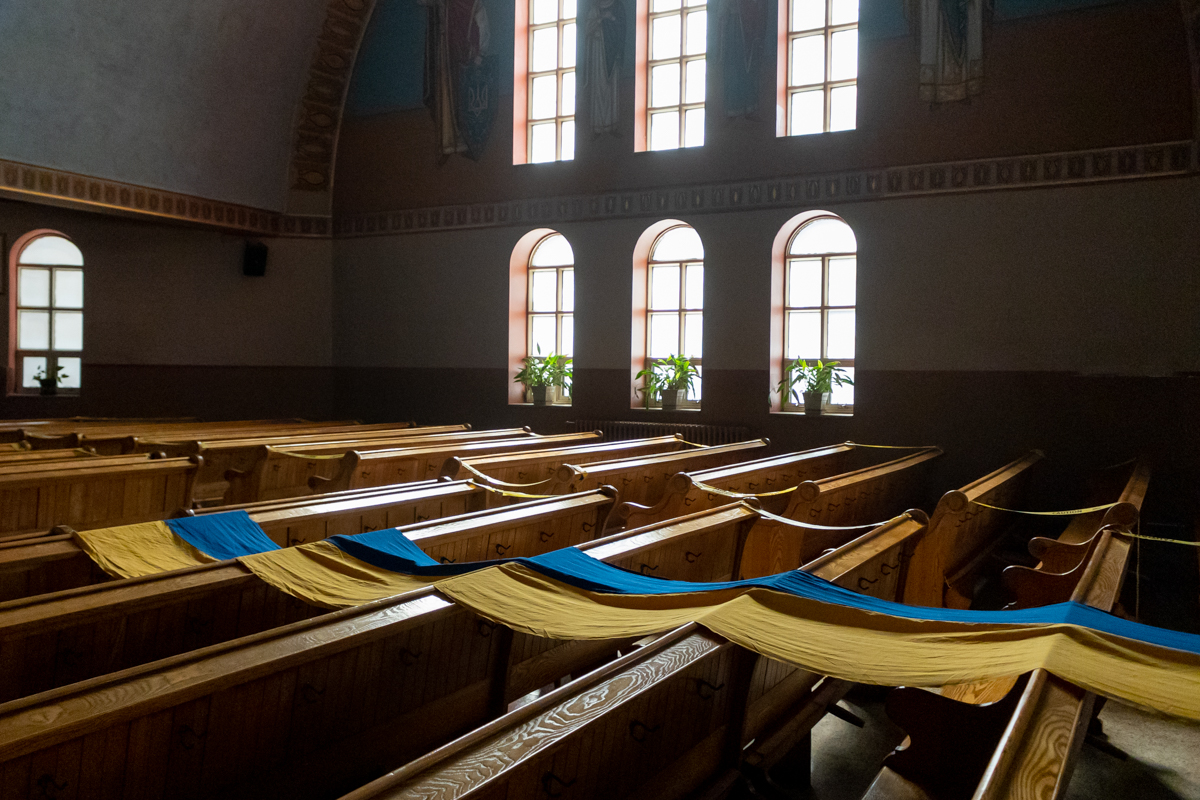Many small efforts contribute to helping the incoming refugees after millions flee the war zone
Following Montreal’s first solidarity rally to support Ukrainians facing the Russian invasion, Montrealers are proactively preparing for relief efforts to help Ukrainians. The rally was organized by McGill and other universities on Feb. 24.
On the evening of March 9, Concordia University and Université de Montréal joined together to help the McGill Ukrainian Students’ Association (MUSA) make perogies (a popular Ukrainian dish) and donuts for a fundraiser scheduled the next day.
All the money collected went to the Ukrainian Canadian Congress (UCC) and the Canada-Ukraine Foundation.
“What can we do as students right now?” asked Julia Hukowich, social and cultural director of MUSA. “You know, it’s small; we can probably only raise a couple of hundred dollars from this, but it’s something,” Hukowich added.
By the end of their fundraiser, the MUSA collected close to $900, with over 65 students attending the fundraiser showing support.
Annika Pavlin, a first-year international development student at McGill, shared her disappointment towards McGill while in line.
Concordia, along with McGill, shared their positions regarding the war in Ukraine in recent emails. Both universities defined Russia’s invasion as “conflict.”
“I’m here to support the private organizations, the clubs that have had to do what McGill is refusing to do, which is raise money, raise awareness,” said Pavlin.
Vitalia Khmil, president of the Concordia Ukrainian Students’ Union (CUSU), shared the same frustration as Pavlin.
“They just sent us an email […] they’re trying to stay inclusive. They didn’t mention anything about a war per se. They said ‘conflict,’ and it’s really important to get the vocabulary right because it’s clearly a war going on,” said Khmil.
Along with Khmil, Markel Reva, VP Finance of the CUSU, agreed Concordia can and should do more to help.
“They provided us with links to psychological care here and helplines, stuff like that, but that’s literally it”, said Khmil.
The current situation in Ukraine is very distressing for students like Khmil and Reva, who are trying to focus on midterms while their extended family is currently in Ukraine.
“We are trying to contact our universities to see how can we help Ukrainian students because we have midterms, we have exams, we have quizzes, and with all [that] happening […] I couldn’t read a single thing on my paper,” said Reva.
On Wednesday, Reva met with Andrew Woodall, Dean of Students at Concordia University, hoping to get more help.
“It is still very unclear on the position that Concordia is taking regarding the Russian aggression and the war in Ukraine.”
Woodall suggested that Reva speak with Graham Carr, President and Vice-Chancellor of Concordia University.
Though Reva can’t do much at Concordia right now, he and his family have offered their help through donations to St. Michael’s Ukrainian Catholic Church.
Among the many churches turning into donation centres for Ukrainian refugees, St. Michael’s Ukrainian Catholic Church has been accepting donations for refugees since Feb. 26, the third day of the Russian invasion.
St. Michael’s Ukrainian Catholic Church is now receiving a large number of donations every day.
About two weeks ago, Reva’s family opened their home in the South Shore to collect donations 24/7 and bring them to the church. This included medication, clothes, food, hygiene products, sleeping bags, and more.
With Prime Minister Justin Trudeau’s new program to facilitate the immigration process of Ukrainian refugees, Montrealers have been helping newcomers through the Ukrainian Canadian Congress (UCC) Montreal Branch. This organization represents around 42,500 Ukrainians in Quebec.
The UCC helps in different ways, working as volunteers to help newcomers find housing, jobs, assisting with documentation, English tutoring, and more. The Canada-Ukraine Authorization for Emergency Travel program will accept an unlimited number of Ukrainians who want to come to Canada temporarily.
“It’s a huge undertaking that needs to be done, and we really appreciate the collaboration that we have with the city of Montreal in particular,” said Michael Shwec, president of the UCC Montreal Branch.
“We’re in a tight connection with the city to put together a robust plan to welcome them and make sure that they have a safe and warm place to stay,” Shwec added.
The UCC also provides a link on their website to donate money through the Canadian Red Cross.
“All Montrealers donating to the Red Cross and helping fund medical supplies and other forms of humanitarian aid are making a powerful impact on Ukraine’s ability to defend its people,” said Bogdan Lytvynenko, former news editor for The Concordian.
“Every dollar is critical. It is heartwarming and inspiring to see Montrealers donating and joining the rest of the world against the Russian aggression even despite being thousands of kilometres away from the warzone,” Lytvynenko added.
